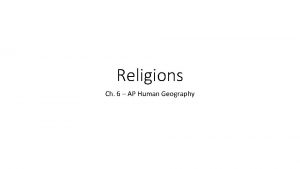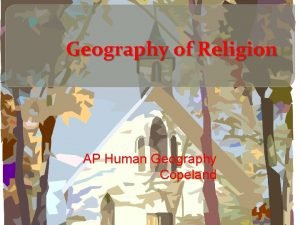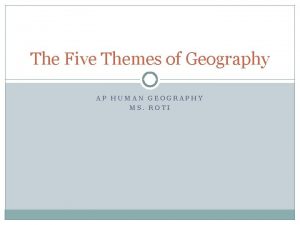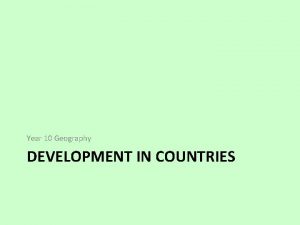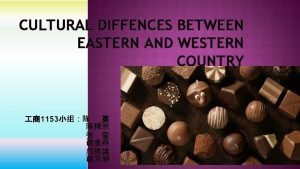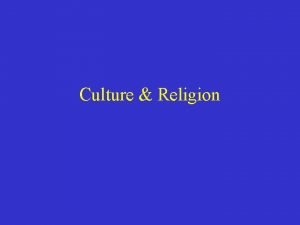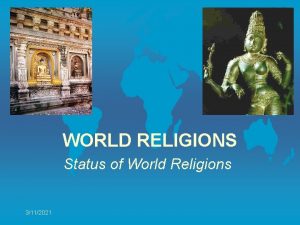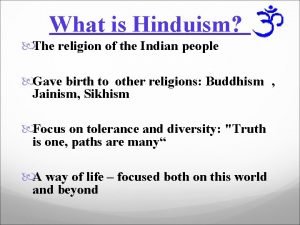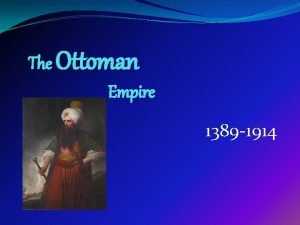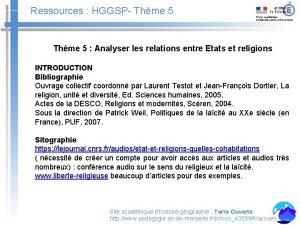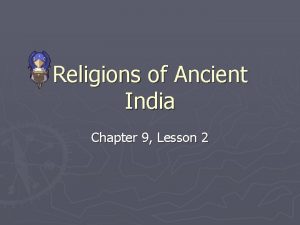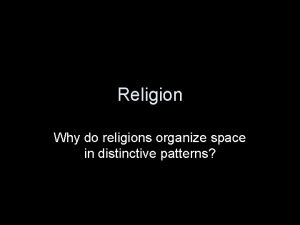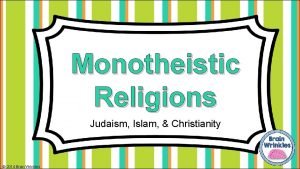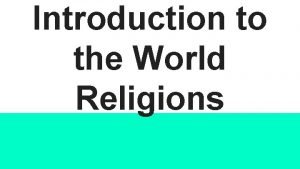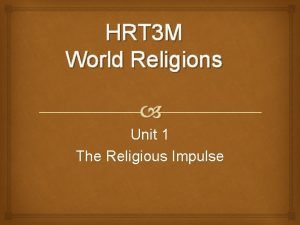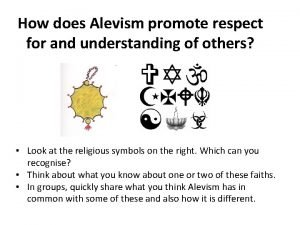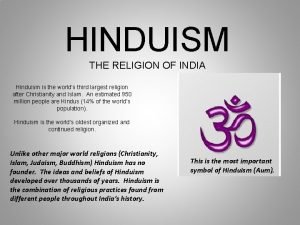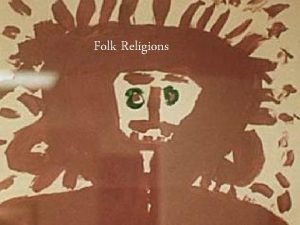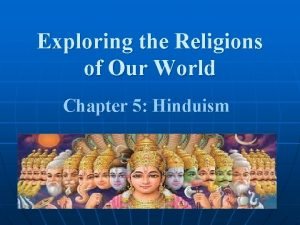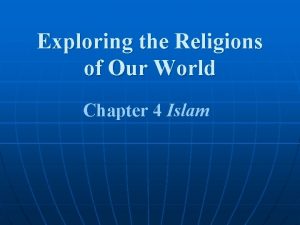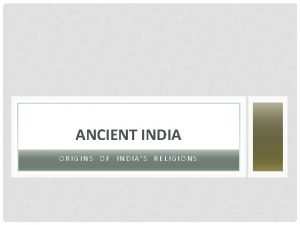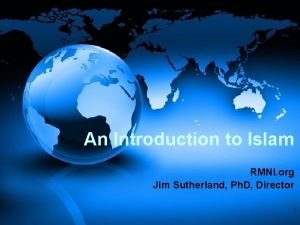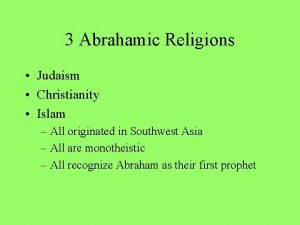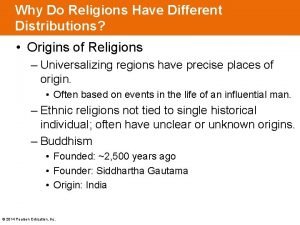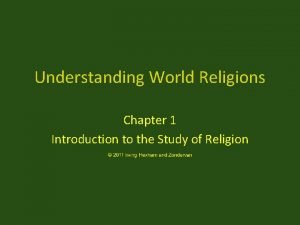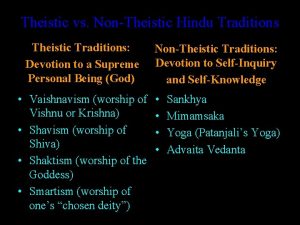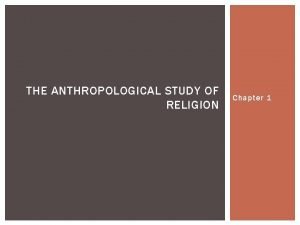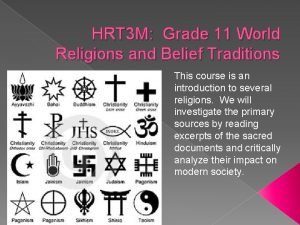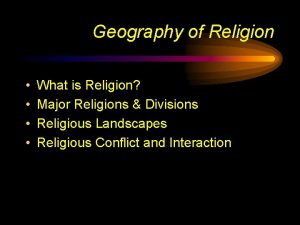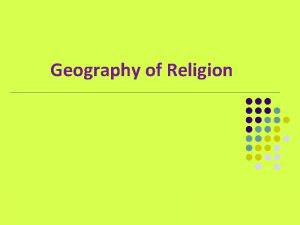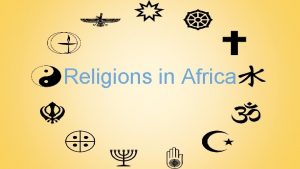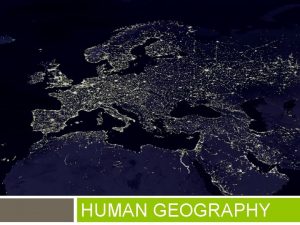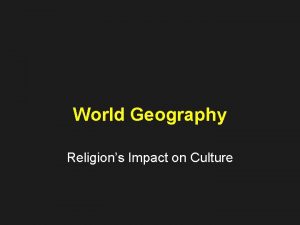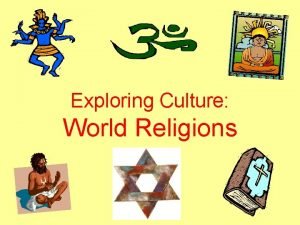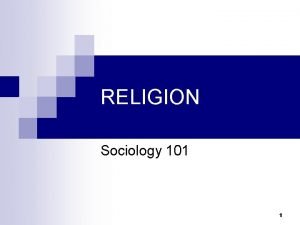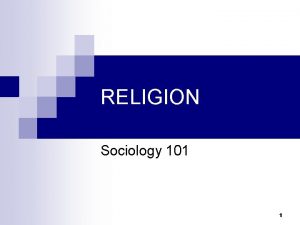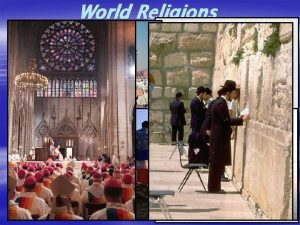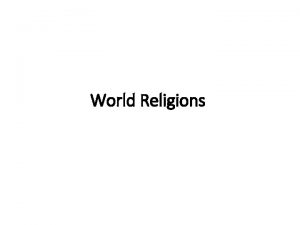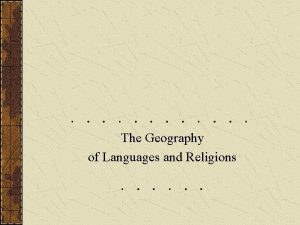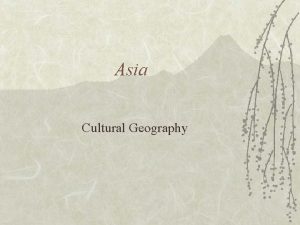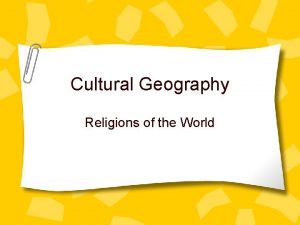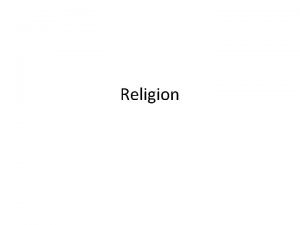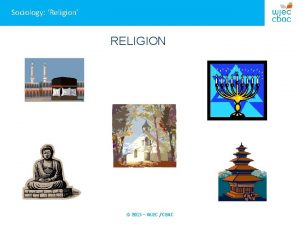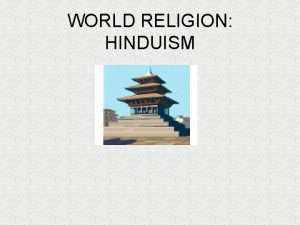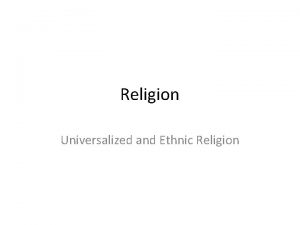Religions Ch 6 AP Human Geography Religion Overview





































- Slides: 37

Religions Ch. 6 – AP Human Geography

Religion Overview

Classifications of Religions • Monotheistic – belief in one deity • Polytheistic – belief in many deities • Animistic – objects (trees, mountains, rivers) have spirits • Atheistic – belief that there is no deity • Cultural Religions – limited to the national culture of a single region – Shinto, Daoism, etc. • Abrahamic Faiths – faiths with a historical association with Abraham, such as Judaism, Christianity, and Islam

Key Characteristics of Religion • Set of doctrines or beliefs relating to a god or gods • Structure or hierarchy of officials • Rituals for birth, death, reaching adulthood, marriage, prayer, routine services on a Fri, Sat, or Sun • Religions are often syncretic • Religions may also provide an explanation of the beginning of the world, or cosmogony

Impact of Religion • Can affect calendars, holidays, agriculture, toponyms, slogans on coins or flags, etc. • Potential positive impacts – education, medicine or health care, the arts, etc. • Potential negative impacts – blocked scientific study, oppression, supported imperialism, can keep women inferior

Universalizing Religions

Universalizing Religions • Religions that actively seek converts because members believe they offer belief systems of universal appropriateness and appeal • Ex: Christianity • Global in nature

Universalizing Religions • Main religions include Christianity, Muslim, and Buddhism • Branches – a large and fundamental division within a religion • Denomination – a division of a branch that unites a number of local congregations into a single administrative body • Sect – can mean a small group that broke away from a bigger group or a religious denomination

Ethnic Religions

Ethnic Religions • Religions whose adherents are born into the faith and whose members do not actively seek converts • Ex: Hinduism • Local in nature

Ethnic Religions • Main: Hinduism – 900 million people • Others • Judaism • Chinese Traditional (Taoism, Confucianism) • Asian and African Primal Indigenous (Shamanism) • Juchte • Spiritism

Religious Hearths, Diffusion, and Distribution

Religions of the Semitic Hearth • Christianity and Judaism share similar hearths around Eastern Mediterranean and present-day Israel • Islam originated in present-day Saudi Arabia and spread through hierarchical and relocation diffusion

Where Religions are Distributed • Christianity • 2 billion adherents, more than any other religion • 90% of the people in N. America are Christians • 93% of Latin America is Catholic (29% in N. America) • Baptists are the largest protestant group in the US • Smaller branches of Christianity include: • Coptic Church of Egypt and the Ethiopian Church • Armenian Church • Church of Jesus Christ of Latter-Day Saints

Where Religions are Distributed • Christianity • Originated with teachings of Jesus and the four gospels of Matthew, Mark, Luke, and John • Catholicism is headed by the Pope • Eastern Orthodox split from Roman Catholics in 1054 • Protestantism came after the Reformation (first headed by Martin Luther and later others)

Where Religions are Distributed • Islam • 1. 3 billion people on Earth • Sunni – 83% of Muslims • Shiite is the other sect • 5% of Europe’s population are Muslims • 5 million Muslims in the US and Canada

Where Religions are Distributed • Islam • Origin begins similarly to Judeo-Christian traditions • Line follows Abraham’s other son • Muhammad was considered a prophet of God • Split between Shiites and Sunnis come from a disagreement over the line of succession in Islamic leadership

Where Religions are Distributed • Buddhism • 400 million adherents around the world • Branches include Mahayana, Theravada, and Tantrayana

Where Religions are Distributed • Buddhism • Began with Siddhartha Gautama in 563 BCE • Siddhartha became the “Buddha” and spent 45 years preaching • Sikhism • Founded by Guru Nanak about 500 years ago • Baha’i • Established in Iran in the 19 th century

Where Religions are Distributed • Hinduism • Third largest religion in world • India

Where Religions are Distributed • Hinduism • No known founder • Existed prior to recorded history • Earliest documents were written around 1500 BCE

Diffusion of Universalizing Religions • Christianity • Relocation Diffusion: Missionaries • Contagious Diffusion: Holy Roman Empire • Hierarchical Diffusion: Emperor Constantine • Expansion Diffusion: Europeans moving

Diffusion of Universalizing Religions • Islam • Expansion Diffusion: Conquering armies • Relocation Diffusion: Missionaries • Contagious Diffusion: Traders to Indonesia • Buddhism • Hierarchical Diffusion: Asoka • Relocation Diffusion: Missionaries • Contagious Diffusion: Traders to China, then to Korea, then to Japan

Diffusion of Ethnic Religions • Lack of Diffusion of Ethnic Religions • No missionaries to carry the message • However, some ethnic and universalizing religions have mingled over time • Judaism • Practiced in many places • Diaspora by the Romans • Migration to Europe • Ghettos • WWII

Religion, Society, and Globalization

Holy Places in Universalizing Religions • Buddhist Shrines • Lumbini in Southern Nepal, Bodh Gaya, Deer Park in Sarnath, Kusinagara, Sravasti, Samkasya, Rajagrha, Vaisali • Holy places in Islam • Mecca home to Al—Ka’ba, the Great Mosque • Medina home to Muhammad’s tomb • Holy places in Sikhism • Darbar Sahib – the Golden Temple

Holy Places in Ethnic Religions • Hinduism • Riverbanks and coastlines • The Ganges River

Sacred Space • Pilgrimages – journey to a sacred place or site • Community, Identity, and Scale – religion can provide both a basis for community and identity • Ex. Muslim community can be expressed at global or local scales • Religion and Settlement • Diasporas (especially among Jewish) • Migration to escape persecution (Mormons movement to Utah) • Places can become sacred through a process of sanctification

Religious Law and Social Space • Christianity • In US, typically a separation between church and state • Some states have Sunday-closing laws or blue laws (where sale of nonessential merchandise is prohibited) • Judaism • Sabbath (Friday to Saturday evening) • Jewish law, halacah, and Kosher dietary principles derived from the Torah • Islam • Sharia – Islamic law derived from the Qur’an

Religious Conflicts

Tradition and Change • Modernism refers to increased scientific thought, expansion of knowledge, and belief in progress • Secularization reduces the scope or influence of religion • This can cause a lot of conflicts!

Religion vs. Gov’t Policies • Fundamentalism is a literal interpretation and strict adherence to basic principles of a religion • Fundamentalism allows a group to maintain a cultural identity • Many religious groups oppose gov’t policies that would affect social change

Religion vs. Social Change • Taliban vs. Western Values • Taliban in Afghanistan spread very strict laws as they saw them in the Qur’an • Taliban banned all “Western activities” and destroyed Buddhist statues • Hinduism vs. Social Equality • Caste system conflicts with idea of social mobility

Religion vs. Communism • Eastern Orthodox Christianity and Islam vs. the Soviet Union (USSR) • Bolshevik Revolution and creation of the USSR brought conflict • End of USSR brought a resurgence in religion • Buddhism vs. Southeast Asian Countries • Destruction of shrines • Self-immolation in protest

Religion vs. Religion • Religious Wars in Ireland • N. Ireland • Protestants v. Roman Catholics • IRA • Ulster Defense Force

Religion vs. Religion • Religious Wars in the Middle East • Christians, Muslims, and Jews all value the “Holy Land” and Jerusalem • Crusades between Christians and Muslims • Arab army invaded Europe as far as France • Arabs controlled Spain until 1492 • Crusades to take Jerusalem started in 1099

Religion vs. Religion • Jews vs. Muslims in Palestine • Started in the 1930 s • Israel and Palestine has conflict over holy land
 Denomination ap human geography
Denomination ap human geography Sikhism ap human geography
Sikhism ap human geography Frq examples ap human geography
Frq examples ap human geography 5 themes of geography ap human geography
5 themes of geography ap human geography Proruption ap human geography
Proruption ap human geography Human development index definition ap human geography
Human development index definition ap human geography Secneer
Secneer Distribution of religions in the world
Distribution of religions in the world Nature of hrm
Nature of hrm Agnotie
Agnotie What is reincarnation in hinduism
What is reincarnation in hinduism Was the ottoman empire tolerant of other religions
Was the ottoman empire tolerant of other religions Religions that believe in reincarnation
Religions that believe in reincarnation Bibliographie hggsp terminale
Bibliographie hggsp terminale Chapter 9 lesson 2 religions of ancient india
Chapter 9 lesson 2 religions of ancient india Why do religions organize space in distinctive patterns
Why do religions organize space in distinctive patterns Religions that believe in reincarnation
Religions that believe in reincarnation Christianity and confucianism venn diagram
Christianity and confucianism venn diagram World religion map
World religion map What do all religions have in common
What do all religions have in common The golden rule in all religions
The golden rule in all religions Is hinduism a religion
Is hinduism a religion Religion
Religion Exploring religions chapter 5 large
Exploring religions chapter 5 large Exploring religions chapter 4 large
Exploring religions chapter 4 large Ethnic religion examples
Ethnic religion examples Indias religions
Indias religions Major branches
Major branches Indias religions
Indias religions Which are abrahamic religions
Which are abrahamic religions Why do religions have distinctive distributions
Why do religions have distinctive distributions World religions chapter 1
World religions chapter 1 Theistic vs non theistic
Theistic vs non theistic Primal religions
Primal religions Religion
Religion Islam vs. christianity venn diagram
Islam vs. christianity venn diagram Sw asia's religions cloze notes 1
Sw asia's religions cloze notes 1 World religions grade 11
World religions grade 11
